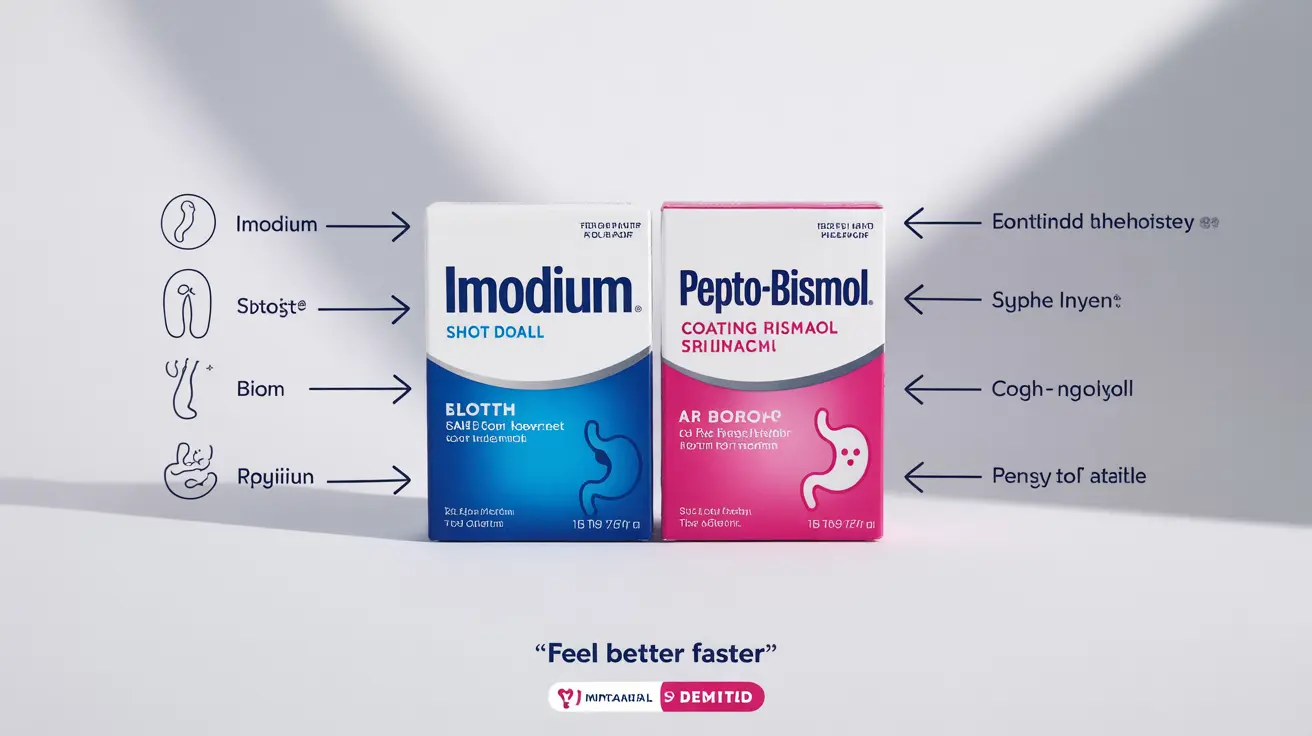When dealing with diarrhea, many people wonder about combining different over-the-counter medications for faster relief. Understanding whether you can take Imodium and Pepto-Bismol together, and how these medications differ, is crucial for safe and effective treatment of digestive issues.
This comprehensive guide will explore the safety, effectiveness, and proper usage of these common anti-diarrheal medications, helping you make informed decisions about your digestive health.
How These Medications Work
Imodium (loperamide) and Pepto-Bismol (bismuth subsalicylate) work differently to address diarrhea symptoms:
Imodium's Mechanism of Action
Imodium works by slowing down intestinal movement and reducing fluid secretion in the bowels. It specifically targets the opioid receptors in the intestinal muscles, helping to normalize bowel function and decrease the frequency of bowel movements.
Pepto-Bismol's Mechanism of Action
Pepto-Bismol functions by coating the digestive tract, reducing inflammation, and providing antimicrobial properties. It can help relieve multiple digestive issues, including nausea, heartburn, and indigestion, in addition to diarrhea.
Safety Considerations for Combined Use
While it's generally possible to take Imodium and Pepto-Bismol together, there are important factors to consider:
Timing and Dosage
If you choose to use both medications, it's recommended to space them apart by at least 2-3 hours. This spacing helps prevent potential interactions and allows each medication to work effectively.
Potential Risks
Taking both medications simultaneously may increase the risk of constipation or other digestive complications. It's important to start with one medication first and only add the second if necessary for symptom relief.
When to Use Each Medication
Choose Imodium When:
- Experiencing watery diarrhea without fever or blood in stool
- Needing longer-lasting diarrhea relief
- Dealing with traveler's diarrhea
Choose Pepto-Bismol When:
- Experiencing multiple digestive symptoms
- Dealing with mild diarrhea and nausea
- Seeking relief from stomach upset and indigestion
Precautions and Contraindications
Certain medical conditions and situations require careful consideration before using either medication:
Medical Conditions to Consider
- Inflammatory bowel disease
- Bleeding disorders
- Kidney or liver problems
- Fever or bloody stools
Medication Interactions
Both medications can interact with various prescription drugs, including blood thinners, antibiotics, and other digestive medications. Always consult with a healthcare provider about potential interactions.
Frequently Asked Questions
Can I take Imodium and Pepto-Bismol together for diarrhea relief?
Yes, you can take Imodium and Pepto-Bismol together, but it's recommended to space them 2-3 hours apart. Start with one medication first and only add the second if necessary for additional symptom relief.
What are the most common side effects of taking Imodium A-D versus Pepto-Bismol?
Imodium's common side effects include constipation, stomach pain, and dizziness. Pepto-Bismol may cause temporary darkening of the tongue or stools, nausea, and constipation. Both medications can cause different side effects, so monitoring your body's response is important.
How do Imodium and Pepto-Bismol work to treat diarrhea, and what are their main differences?
Imodium slows intestinal movement and reduces fluid secretion, specifically targeting diarrhea. Pepto-Bismol coats the digestive tract, reduces inflammation, and has antimicrobial properties, addressing multiple digestive issues including diarrhea, nausea, and indigestion.
Are there any specific medical conditions where it's not recommended to use Imodium or Pepto-Bismol?
Both medications should be avoided in cases of bloody stools, severe abdominal pain, or fever. People with inflammatory bowel disease, bleeding disorders, or certain allergies should consult their healthcare provider before use.
Can I use Imodium A-D and Pepto-Bismol if I'm already taking other medications like antibiotics?
Both medications can interact with various drugs, including antibiotics. Always consult with your healthcare provider or pharmacist about potential interactions before combining these medications with prescription drugs.




